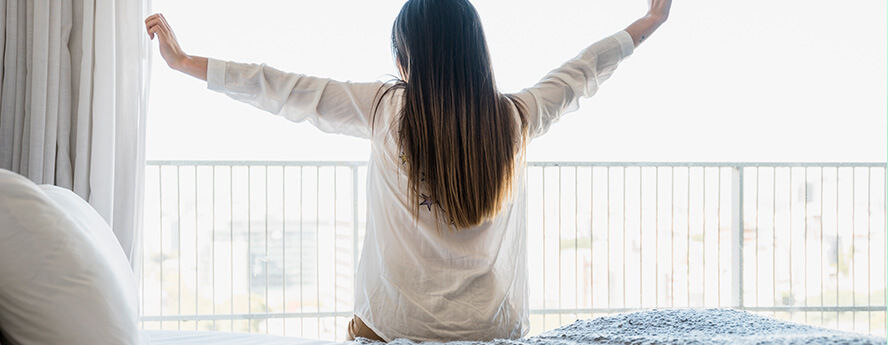
This week marks the beginning of the British Summer Time (BST), which means the clocks go forward one hour on Sunday morning at 1 am. In the UK, clocks change twice every year, once in March (when the clocks go forward) and once in October (when the clocks go back). The period we are approaching now, between March and October, is also called Daylight Saving Time because there’s more daylight in the evening and less in the morning.
After several attempts by a number of people to introduce this practice, Germany was the first to succeed in turning the clocks forward to conserve the energy of their army in World War One. After Germany, many other European countries followed, including the UK. Although the Daylight Saving Time helps us get more sunlight in the day and certain economic sectors like farming rely on the clocks changing for their work, it can also upset our natural sleep rhythm and could lead to health problems.
How does Daylight Saving Time hurt our sleep?
Our bodies have an internal clock called the circadian rhythm which is good at anticipating environmental changes happening around us, helping us adapt, and it also supports the essential biological and physiological processes in our bodies, including our sleep-wake cycle.
The circadian rhythm is tied to the cycle of day and night so it can go off track when we disrupt its natural course, for example, when we work night shifts, when we travel to other time zones or when the clocks change twice a year. When our circadian rhythm is out of sync, we can experience sleep problems, memory problems and lack of energy. In the long run, it can affect our cardiovascular system, metabolism and gastrointestinal system and even increase the risk of more serious health conditions such as diabetes, obesity and mental health issues.
To make sure the changing clocks won’t wreak havoc on your sleep patterns and to minimise the effects “the lost hour” has on your health, here are a few tips to help you ease the transition:
1. Gradually adjust your bedtime in the days leading up to the change
Back up your sleep by around 20 minutes for at least 3 nights before Daylight Saving Time occurs. For example, if your regular bedtime is at 10 pm, try going to bed at 9:40pm on Thursday, then at 9:20pm on Friday and finally, at 9pm on Saturday. Adjusting our sleep over a few days rather than suddenly skipping an hour’s sleep on Saturday will help avoid an unnecessary shock to the internal body clock. To help you move back your bedtime, you can also adjust the time of other daily routines that are “time cues” for your body such as waking time and meal times.
2. Reduce exposure to light before and when going to bed
In the hours leading up to bedtime, our brains start to produce a sleep-inducing hormone called melatonin, which causes our alertness to decrease. But exposure to light before bed, whether it’s from your phone or a lamp, affects your melatonin levels and tricks the brain into thinking that it is daytime, therefore melatonin production is suppressed and sleep becomes delayed.
The NHS recommends not using smartphones, tablets and other devices one hour before bed and you should also try to keep your room as dark as possible by closing your blinds and turning off any source of light during sleep.
3. Be mindful of your caffeine and alcohol intake on Saturday evening
According to an NHS guide, consuming caffeinated drinks such as coffee, tea, coke and energy drinks after 5 pm may disrupt your sleep.
Another drink that can negatively affect the quality of your sleep is alcohol. Even though a glass of wine in the evening could make you feel more relaxed and help you fall asleep faster, alcohol reduces the amount of deep sleep and REM sleep you get, which are needed for your body to heal and restore itself during sleep. Drinking alcohol before bed can also make you need the toilet frequently during the night, interrupting your sleep and making you feel tired the next day.
4. Don’t let yourself oversleep on Sunday morning
Even if it’s the weekend and it’s all too easy to make up for the “lost hour” by sleeping in, it’s best to set up an alarm to wake you up at around the same time you usually wake up during the week. Oversleeping the morning after the clocks go forward can delay your circadian rhythm’s ability to adjust to the change. Moreover, keeping a regular sleep routine over the following days and getting up at the same time every day it’s important in helping your body adapt.
5. Spend some time outdoors in the sunlight on Sunday
If you can, go outside to get some sunlight as soon as you wake up on Sunday morning. This will help your body adjust and stop the release of melatonin, increasing your alertness. Exercising in the morning may also help adjust your body clock, as physical activity increases your cortisol levels (the stress hormone) immediately after a workout, making you feel awake and alert, and decreases cortisol at night-time, helping you have a better sleep.
* * *
Daylight Saving Time can mess with many people’s internal rhythm, making you lose sleep during the night and feel drowsy during the day. Even though it could take some time for your body to adjust to the new time, some forward planning and a few small changes before and after the clocks go forward, could help speed up the process. If you cannot apply any of the tips above, prioritising sleep in your own way over the next few days could really make a difference.
Disclaimer: The content of this article is provided for informational purposes only and does not substitute the medical advice from a healthcare professional.